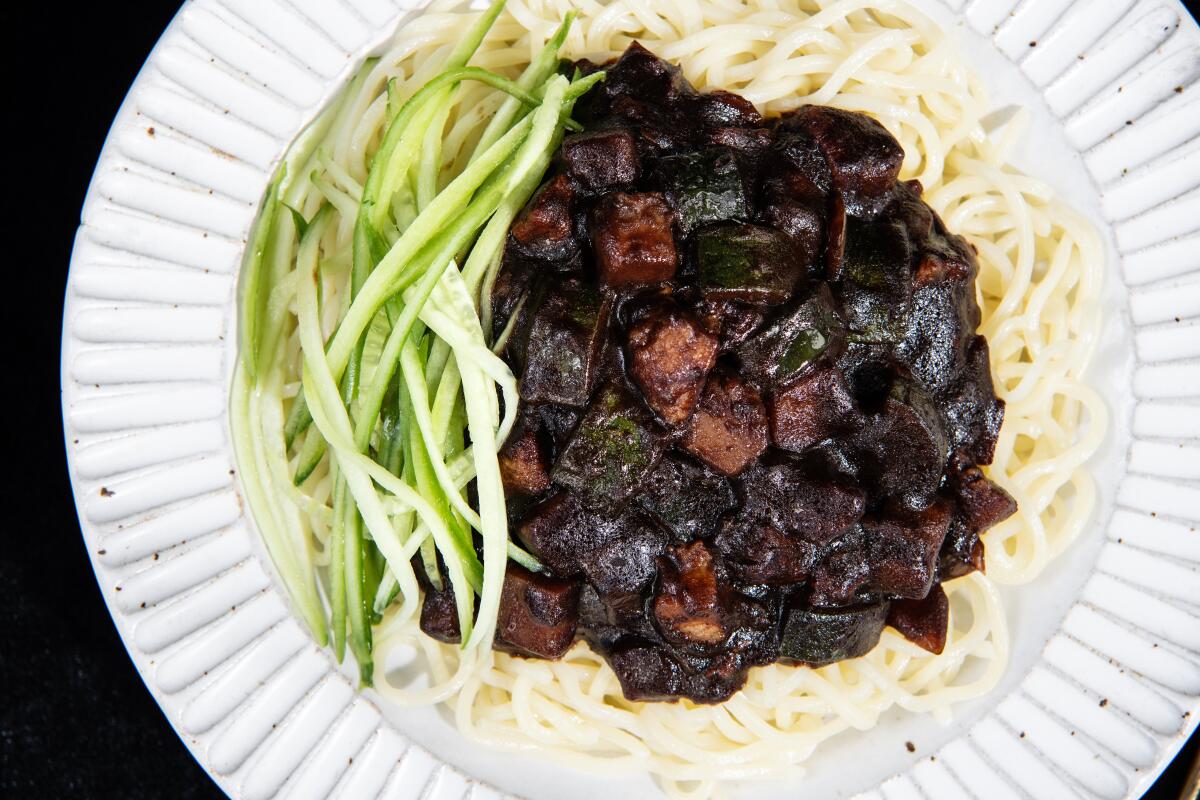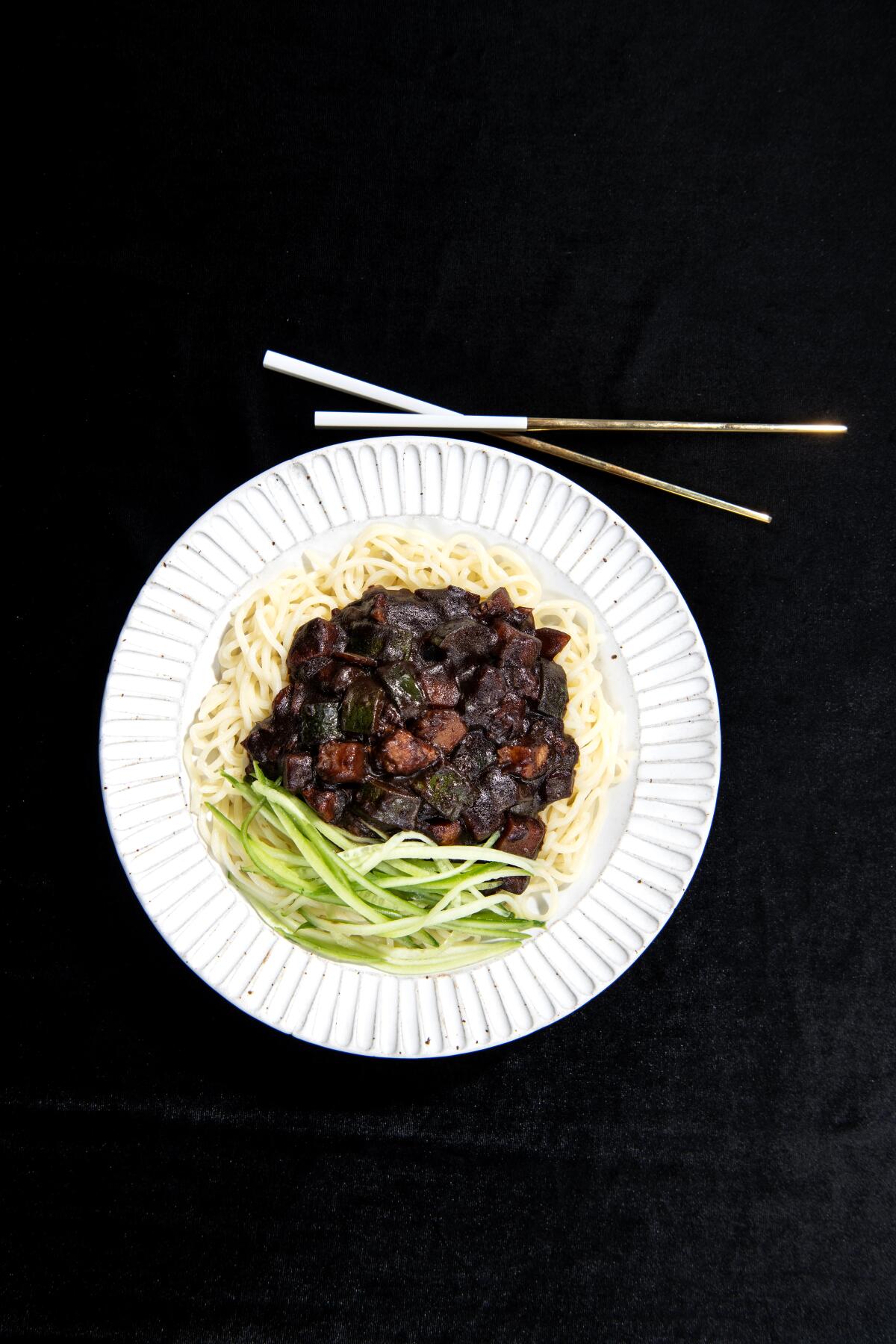Roses are black, your heart is black, these noodles are black

- Share via
In America, Feb. 15 is Singles Awareness Day. Its acronym pretty much sums up the feels of that “holiday.”
In South Korea, there’s a similar day set aside for singles: Black Day, which falls on April 14. To celebrate, the unattached dress in all black and hang out with other single friends to commiserate or wallow solo. Some even go so far as to eat black food, which means they’re probably eating jajangmyeon, a dish of springy white noodles stained by dark-as-ink black bean sauce.
If you think it sounds like the Northern Chinese dish zhajiangmian, that’s because it’s a direct descendant. Immigrants brought the saucy dark noodles to South Korea and evolved it into a Korean-Chinese standard. The Chinese version is saltier and sharper, with a runnier sauce speckled with ground pork; the thicker Korean ragu is lightly sweeter and dotted with chunks of meat and vegetables.
The first time I had jajangmyeon was in college, when my roommate’s mom would stack containers of her homemade sauce in our freezer. The recipe below stems from those taste memories of comforting cubes of tender pork and potato swirled with zucchini and onion in a sweetened black bean sauce with a sesame richness. We’d defrost a batch and slurp the noodles together, happier on the couch in our sweats than out on dates in heels. Even if we had been sad about college boys, we’d forget about them after the first chewy bite.

Jajangmyeon
30 minutes. Serves 1 to 2.
This recipe makes enough sauce for two servings but just enough noodles for one so that you can save the remaining sauce for another day. Double the noodles if you’d like to share this dish or eat an extra-large portion on your own. You can find chunjang, sometimes labeled fermented black bean paste or simply black bean paste, online and in Korean markets. The same is true of the noodles, but you can substitute spaghetti or linguine as well.
Ingredients
- 1 tablespoon grape seed or other neutral oil
- 8 ounces boneless pork belly or shoulder, cut into ½-inch dice
- 1 medium white potato, peeled and cut into ½-inch dice
- 1 small yellow onion, cut into ½-inch dice
- 1 small zucchini, trimmed and cut into ½-inch dice
- 1/3 cup Korean fermented black bean sauce
- 3 ounces fresh jajangmyeon noodles or 6 ounces dried
- 2 teaspoons granulated sugar
- 1 teaspoon toasted sesame oil
- 1 mini or Persian cucumber, cut into matchsticks
Instructions
- Heat the grape seed oil in a wok or large skillet over medium-high heat. Add the pork and potato and cook, stirring occasionally, until the pork is golden brown and crisp, 4 to 5 minutes.
- Add the onion and zucchini and cook, stirring, until the onion starts to look translucent, 3 to 4 minutes. Add the black bean sauce and cook, stirring, for 1 minute. Stir in 2 cups water, raise the heat to high and bring to a boil. Cover partially with a lid, reduce the heat to medium-low and simmer until the pork and potato are cooked through, about 10 minutes.
- Meanwhile, cook the noodles according to the package’s directions.
- Uncover and smash a few potatoes into the sauce to thicken it. Add the sugar and sesame oil and stir well. Transfer the noodles to a serving dish and top with the sauce and cucumber.
Variation
Vegan jajangmyeon: Substitute 8 ounces thick shiitake mushrooms, stemmed and cut into ½-inch dice, for the pork belly, and sear them in 3 tablespoons oil in a hot skillet; proceed as above.
Make Ahead
The cooked sauce can be refrigerated in an airtight container for up to 5 days or frozen for up to 2 months.
More to Read
Eat your way across L.A.
Get our weekly Tasting Notes newsletter for reviews, news and more.
You may occasionally receive promotional content from the Los Angeles Times.











